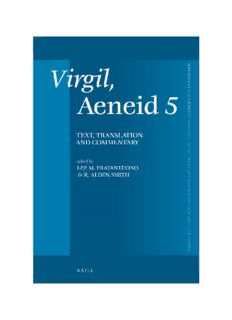
Virgil, Aeneid 5: Text, Translation and Commentary PDF
Preview Virgil, Aeneid 5: Text, Translation and Commentary
Virgil,Aeneid5 Mnemosyne Supplements monographs on greek and latin language and literature ExecutiveEditor G.J.Boter(vuUniversityAmsterdam) EditorialBoard A.Chaniotis(OxfordUniversity) K.M.Coleman(HarvardUniversity) I.J.F.deJong(UniversityofAmsterdam) T.Reinhardt(OxfordUniversity) AdvisoryBoard K.A.Algra–R.J.Allan–M.A.Harder–S.Harrison C.H.M.Kroon–A.P.M.H.Lardinois–I.Sluiter–F.M.J.Waanders volume386 Thetitlespublishedinthisseriesarelistedatbrill.com/mns Virgil, Aeneid 5 Text,TranslationandCommentary Editedby LeeM.Fratantuono R.AldenSmith leiden | boston LibraryofCongressCataloging-in-PublicationData Virgil,author. Aeneid5/Virgil;text,translationandcommentarybyLeeM.Fratantuono,R.AldenSmith. pagescm–(Mnemosyne.Supplements;volume386) ISBN978-90-04-30124-5(hardback:alk.paper)–ISBN978-90-04-30128-3(e-book) 1.Virgil.Aeneis.I.Fratantuono,Lee,1973-II.Smith,R.Alden.III.Virgil.Aeneis.Liber5.2015.IV.Virgil. Aeneis.LiberV.English.2015.V.Title.VI.Series:Mnemosyne,bibliothecaclassicaBatava.Supplementum;v. 386. PA6807.A5F732015 873'.01–dc23 2015023041 Thispublicationhasbeentypesetinthemultilingual“Brill”typeface.Withover5,100characterscovering Latin,ipa,Greek,andCyrillic,thistypefaceisespeciallysuitableforuseinthehumanities.Formore information,pleaseseewww.brill.com/brill-typeface. issn0169-8958 isbn978-90-04-30124-5(hardback) isbn978-90-04-30128-3(e-book) Copyright2015byKoninklijkeBrillnv,Leiden,TheNetherlands. KoninklijkeBrillnvincorporatestheimprintsBrill,BrillHes&DeGraaf,BrillNijhoff,BrillRodopiand HoteiPublishing. Allrightsreserved.Nopartofthispublicationmaybereproduced,translated,storedinaretrievalsystem, ortransmittedinanyformorbyanymeans,electronic,mechanical,photocopying,recordingorotherwise, withoutpriorwrittenpermissionfromthepublisher. AuthorizationtophotocopyitemsforinternalorpersonaluseisgrantedbyKoninklijkeBrillnvprovided thattheappropriatefeesarepaiddirectlytoTheCopyrightClearanceCenter,222RosewoodDrive, Suite910,Danvers,ma01923,usa.Feesaresubjecttochange. Thisbookisprintedonacid-freepaper. Contents PrefaceandAcknowledgments vii Introduction 1 Bibliography 35 AdLectorem 57 CriticalText 59 Translation 91 Commentary 111 IndexNominum 733 IndexRerum 747 IndexVerborum 755 Preface and Acknowledgments ThefifthbookoftheAeneidhasnotbeenthedarlingofcommentatorsandcrit- icsofVirgil’snarrativeepic.Anglophonestudentsandscholarsonbothsides oftheAtlanticareperhapsmostlikelytoturntoR.D.Williams’edition,either hiscomplete Aeneidof1972–1973(fortheMacmillan“Reds”),orhis1960stan- dalonetreatmentofBook5(fortheOxfordVirgilproject).Theeditorsofthe presentvolumeshareNicholasHorsfall’spublishedjudgmentonWilliamsas Virgiliancommentator;hisBook5is,however,rathermoreusefulinouresti- mationthanhisOxfordBook3atsolvingcertainproblemsofinterpretation. Butingeneral,theparticularproblemsofBook5havebeensomewhatbetter servedbytreatmentsinjournalarticlesthanincommentaries. ItisnotatalleasytodiscernwhyBook5hasnotreceivedmoreenthusiastic studyandconsideration.Itisinsomewaysthemostdiverseinsubjectandeven styleofthebooksoftheepic,consistentlymaintainingtheattentionofareader- shipofvariedinterests.And,too,Book5ispartofthe“Odyssean”Aeneidthatin somequarters(atleastuntilcomparativelyrecently)hasreceivedrathermore attentionthanthelaterbooksofthepoem.Ourinvestigationofitstreasures anddifficultiesalikehasconvincedusthatBook5showsahighlydeveloped andpolishedstateofcraftsmanshipandrevision;ithassignificantconnections toandaffinitieswithits“sister”Book11.ThepenultimatebooksoftheIliadic andOdysseanAeneidsserveashingesthatprovidestructureandfoundationfor theepic;Books5and11preparethereaderfortheemotionalclimaxesofBooks 6and12.BothbooksserveassomethingofAeneidsinminiature,asmicrocosms oftheepicthatcomplementandcompleteeachother—indeed,Books5and11 areessentialprolegemonatothefullerexpositionsoftheVirgilianvisionin6 and12.Andthatepicvisionis,perhapsaboveallelse,thestoryofthesuppres- sionofTrojanmoresinthewakeoftheadventofanewItalythatwillbethe birthplaceofaRomethatwillberebornunderAugustus. Thepresentcommentaryisintendedinanimportantsenseforanyonewho hasaloveforVirgilandasenseofwonderatthemagicofhisverse.Itislongand dense(andeasilycouldhavebeenlongeranddenser—and,conversely,rather lessexpansiveandmoreabbreviatedincertainaspects).Itisaimedprimarily atascholarlyaudiencethathassomefamiliaritywiththepaths(bothpaved and not) of Virgilian criticism and research, and to graduate and university students. It is, like all commentaries, highly idiosyncratic, perhaps more so giventheoccasionallydivergentviewsofthecoeditors—viewsthatmaywell havecoalescedintoaunityindiversityoverthecourseofitscomposition,a diversitythatperhapsgentlyreflectsattimesthetoneofthepoet.Thelabelsof viii preface and acknowledgments “optimist”and“pessimist”arebothconvenientandusefullyuselessinVirgilian criticism;thepresentwork,allthesame,mayrepresentsomethingofafusion ofthetwosimultaneouslyexistentandevanescentperspectives,evenif,onthe whole,Book5hasproventobedarkerthanoneoftheeditorsmighthavefirst anticipated. It is not easy to share the task of producing a commentary on a book of Virgil,letaloneanewcriticaltextandEnglishprosetranslation.Asweparceled out the tasks, almost all of the work on the apparatus criticus fell to Smith, whotraveledextensivelyinEuropeandabitstatesidetostudyinpersonboth manuscriptsandpapyri.Asapartoftheexerciseofestablishinganewcritical edition, the first draft of the translation was also his, and the first draft of the introduction. The vast majority of the work on the commentary fell to Fratantuono. Yet this division of labor is misleading in that every line of the entireworkhasbeenrevisedafterthelongandcarefulprocessofexchangeof draftsandnotesandrevisionsthereof.Thetwoeditors,simplyput,takeshared responsibilityforallthatappearsherein;thereisnoinstancewherewehave recordedadisagreement.InthisregardtheEnglishlanguagehaswonderfully usefuladverbs(“likely”;“perhaps”)thatwehaveemployedliberally. If there has been inspiration for the present work in the Virgil commen- tariesthathaveprecededit,firstplacemustgotoNicholasHorsfall.Professor Horsfall’s work on a pentad (and counting) of books of the Aeneid has been constantlyathandduringthecompositionofthisvolume,andtohimweowe adebtofsinceregratitudeforhisachievement.ThecommentariesofRoland Austin (especially on Books 1 and 2) have also been regularly consulted and appreciated for their humanity and incisive judgment. Though their contri- butions are obviously vastly different (and they are so in a variety of ways), thosequalities—humanityandincisivejudgment—arethesignalfeaturesof thecontributionsofbothAustinandHorsfall.Ingeneralterms,forusthework ofproducingalengthycommentaryonabookofVirgilhasinspiredrespectand appreciationforthelaborsofourpredecessorsandcolleagues;inthepresent volume,wehavehopedtoconveyastrongsensenotonlyofourloveforVirgil, butalsoofourgratitudetootherclassicistsfortheeffortstheyhavemadein explicatinghistextandunravelinghismysteries. Work on Book 5 could not have proceeded as quickly and with as much helpful elucidation of Virgiliana absent the wonderful treasure that is the VirgilEncyclopediaofRichardThomasandJanZiolkowski.Itwasanespecially welcomeprivilegetohavehadaccesstosomeentriesofthisprojectbeforeit appearedinprint. Indeed our debts are many. Peter Arzt-Grabner, Joe Farrell, Jeff Fish, Nico Knauer,TimJoseph,KarlMaurer,LisaMignone,BlaiseNagy,DamienNelis,Jim preface and acknowledgments ix O’Hara, Piergiacomo Petrioli, Gianni Profita, Jay Reed, David Sweet, Richard Tarrant, Richard Thomas, and Gareth Williams all helped in various ways, whetherwithawillingnesstoentertainaquestion,withthegenerositytoread earlydraftsofnotesandintroduction,or,mostimportantly,bytheexampleof theirownworkonVirgil.ProfessorTarrant’sAPApanelonVirgiliancommen- tarieswasespeciallyhelpfultoFratantuonointhenascentstagesofthiswork. IrenevanRossumfirstworkedwiththeauthorsonbringingthisprojectto Brill;CarolinevonErp,JenniferPavelko,TesselJonquière,andLouiseSchouten haveshepherdeditthroughtocompletion.Toallfiveweoweadebtofgratitude fortheirprofessionalguidanceandhelp.Theanonymousrefereeforthepress mademanymuchappreciatedsuggestionsforimprovement,forwhichweare indebted. IngridPierce,formerlyofBaylorandnowatPurdueUniversity,wasalearned anddelightfulassistantinthecompositionoftheprosetranslationofBook5 thatisincludedinthepresentvolume,andintheeditingofthecommentary. Ourweekofworkon Aeneid5atBaylorUniversityinlateJuneandearlyJuly of 2013 was a treasured experience of fellowship. Michael McOsker (now of Michigan)andCynthiaSusalla(nowofPenn)werekindanddemandingcritics oftheirundergraduateclassicsprofessor.Inthissameregard,MarissaPopeck (nowofVermont)renderedsignalassistance. Smith had the good fortune to offer an advanced Virgil class during the germination period, as the commentary and text were coming “fresh” out of the printer.His class is herethanked deeply for their insights,feedback, and carefulproofreading,toboot.1 WeshouldalsoliketoacknowledgethesupportofProvostCharlesStinemetz of Ohio Wesleyan University, and the office of Truell Hyde, Vice Provost for Research at Baylor, through which Smith obtained a research support grant; inaddition,wewishtothankDeanThomasHibbsofBaylor,forsympathetic adjustmentstoSmith’sadministrativescheduleandhisunflaggingsupportof thisproject. 1 Those budding Virgilian scholars are: Hannah Adams, Wesley Beck, Travis Blake, Susan- nahBrister,KaitlynCarlson,JeffCross,KatieHornell,CaseyHughes,KirstenKappelmann, EvangelineKoztiza,BrittOusley,GabePederson,MarciePersyn,SarahRussell,ErinRusso, CatherineSchenck,HillaryShellnut,RachelSmith,ChristineStanulonis,William,Stover,Jar- rodTunnell,andAshleyWard.OtherstudentswhohelpedwiththisprojectincludeKelsey Bell,KaraKopchinski,andScottMcMickle.Specialthanksareowed,too,toCharmaineDull andThelmaMathews.
Description: